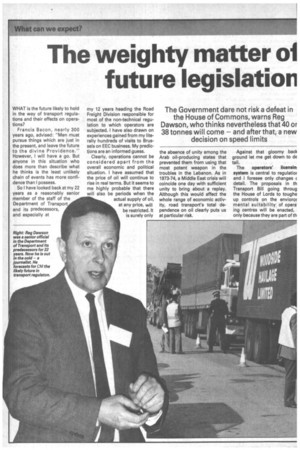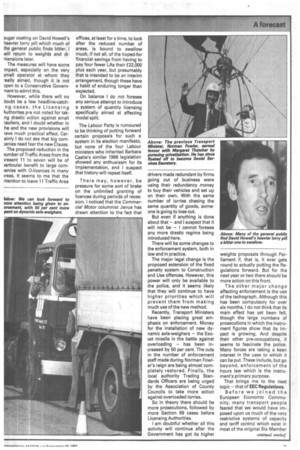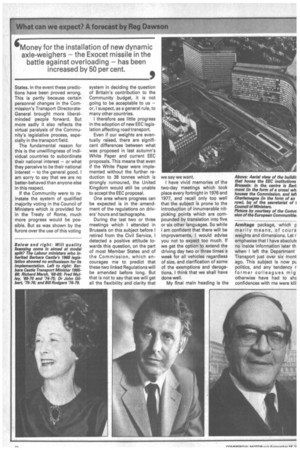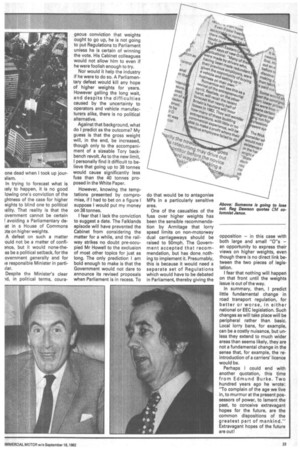The weighty matter al future legislation
Page 16

Page 17

Page 18

Page 19

If you've noticed an error in this article please click here to report it so we can fix it.
WHAT is the future likely to hold in the way of transport regulations and their effects on operations?
Francis Bacon, nearly 300 years ago, advised: "Men must pursue things which are just in the present, and leave the future to the divine Providence." However, I will have a go. But anyone in this situation who does more than describe what he thinks is the least unlikely chain of events has more confidence than I possess.
So I have looked back at my 22 years as a reasonably senior member of the staff of the Department of Transport and its predecessors, and especially at my 12 years heading the Road Freight Division responsible for most of the non-technical regulation to which operators are subjected. I have also drawn on experiences gained from my literally hundreds of visits to Brussels on EEC business. My predictions are an informed guess.
Clearly, operations cannot be considered apart from the overall economic and political situation. I have assumed that the price of oil will continue to rise in real terms. But it seems to me highly probable that there will also be periods when the actual supply of oil, at any price, will be restricted. It is surely only the absence of unity among the Arab oil-producing states that prevented them from using that most potent weapon in the troubles in the Lebanon. As in 1973-74, a Middle East crisis will coincide one day with sufficient unity to bring about a replay. Although this would affect the whole range of economic activity, road transport's total dependence on oil clearly puts us at particular risk. Against that gloomy back ground let me get down to de tail.
The operators' licensin, system is central to regulatior and I foresee only changes detail. The proposals in th Transport Bill going throug the House of Lords to toughe up controls on the envioror mental suitability of opera ing centres will be enacted, only because they are part of th
sugar coating on David Howell's heavier lorry pill which much of the general public finds bitter. I Nil return to weights and di"nensions later.
The measures will have some mpact, especially on the very small operator at whom they .eally aimed, though it is not )pen to a Conservative Governnent to admit this.
However, while there will no ioubt be a few headline-catchng cases, the Licensing Nuthoritessare not noted for takng drastic action against small Iauliers, and I doubt whether in he end the new provisions will lave much practical effect. Cerainly I do not see that big corn)anies need fear the new Clause.
The proposed reduction in the lumber of Traffic Areas from the 'resent 11 to seven will be of )articular benefit to large corn)anies with 0-licences in many ireas. It seems to me that the Mention to leave 11 Traffic Area offices, at least for a time, to look after the reduced number of areas, is bound to swallow much, if not all, of the hoped-for financial savings from having to pay four fewer LAs their £22,000 plus each year, but presumably that is intended to be an interim arrangement, though these have a habit of enduring longer than expected.
On balance I do not foresee any serious attempt to introduce a system of quantity licensing specifically aimed at affecting modal split.
The Labour Party is rumoured to be thinking of putting forward certain proposals for such a system in its election manifesto, but none of the four Labour ministers who inherited Barbara Castle's similar 1968 legislation showed any enthusiasm for its implementation, and I suspect that history will repeat itself.
There may, however, be pressure for some sort of brake on the unlimited granting of licences during periods of recession. I noticed that the Commercial Motor columnist Janus has drawn attention to the fact that
drivers made redundant by firms going out of business were using their redundancy money to buy their vehicles and set up on their own. With the same number of lorries chasing the same quantity of goods, someone is going to lose out.
But even if anything is done about that — and I suspect that it will not be — I cannot foresee any more drastic regime being introduced here.
There will be some changes to the enforcement system, both in law and in practice.
The major legal change is the proposed extension of the fixed penalty system to Construction and Use offences. However, this power will only be available to the police, and it seems likely that they will Continue to have higher priorities which will prevent them from making much use of the new method.
Recently, Transport Ministers have been placing great emphasis on enforcement. Money for the installation of new dynamic axle-weighers — the Exocet missile in the battle against overloading — has been increased by 50 per cent. The cuts in the number of enforcement staff made during Norman Fowler's reign are being almost completely restored. Finally, the local authority Trading Standards Officers are being urged by the Association of County Councils to take more action against overloaded lorries.
So in theory there should be more prosecutions, followed by more Section 69 cases before Licensing Authorities.
I am doubtful whether all this activity will continue after the Government has got its higher weights proposals through Parliament if, that is, it ever gets round to actually putting the Regulations forward. But for the next year or two there should be more action on this front.
The other major change affecting enforcement is the use of the tachograph. Although this has been compulsory for over six months, I do not think that its main effect has yet been felt, though the large numbers of prosecutions in which the instrument figures show that its impact is growing. And despite their other pre-occupations, it seems to fascinate the police. Many forces are taking a keen interest in the uses to which it can be put. These include, but go beyond, enforcement of the hours law which is the instrument's primary purpose.
That brings me to the next topic — that of EEC Regulations.
Before we joined the European Economic Community, many transport people feared that we would have imposed upon us much of the very restrictive systems of capacity and tariff control which exist in most of the original Six Member States. In the event these predictions have been proved wrong. This is partly because certain personnel changes in the Commission's Transport DirectorateGeneral brought more liberalminded people forward. But more sadly it also reflects the virtual paralysis of the Community's legislative process, especially in the transport field.
The fundamental reason for this is the unwillingness of individual countries to subordinate their national interest — or what they perceive to be their national interest — to the general good. I am sorry to say that we are no better-behaved than anyone else in this respect.
If the Community were to reinstate the system of qualified majority voting in the Council of Ministers which is provided for in the Treaty of Rome, much more progress would be possible. But as was shown by the furore over the use of this voting system in deciding the question of Britain's contribution to the Community budget, it is not going to be acceptable to us — or, I suspect, as a general rule, to many other countries.
I therefore see little progress in the adoption of new EEC legislation affecting road transport.
Even if our weights are eventually raised, there are significant differences between what was proposed in last autumn's White Paper and current EEC proposals. This means that even if the White Paper were implemented without the further reduction to 38 tonnes which is strongly rumoured, the United Kingdom would still be unable to accept the EEC proposal.
One area where progress can be expected is in the amendment of the regulations on drivers' hours and tachographs.
During the last two or three meetings which I attended in Brussels on this subject before I retired from the Civil Service, I detected a positive attitude towards this question, on the part of most Member States and of the Commission, which encourages me to predict that these two linked Regulations will be amended before long. But that is not to say that we will get all the flexibility and clarity that we say we want.
I have vivid memories of the two-day meetings which took place every fortnight in 1976 and 1977, and recall only too well that the subject is prone to the introduction of innumerable nitpicking points which are compounded by translation into five or six other languages. So while I am confident that there will be improvements, I would advise you not to expect too much. If we get the option to extend the driving day two or three times a week for all vehicles regardless of size, and clarification of some of the exemptions and derogations, I think that we shall have done well.
My final main heading is the Armitage package, which p manly means, of cours weights and dimensions. Let r emphasise that I have absolut( no inside information later th when I left the Department Transport just over six mont ago. This subject is now pi politics, and any tendency r former colleagues mig otherwise have had to shE confidences with me were kill one dead when I took up jouralism.
In trying to forecast what is cely to happen, it is no good lowing one's conviction of the ghtness of the case for higher eights to blind one to political !ality. That reality is that the overnment cannot be certain avoiding a Parliamentary deat in a House of Commons yte on higher weights.
A defeat on such a matter ould not be a matter of confiance, but it would none-thess be a political setback, for the overnment generally and for le responsible Minister in pal-Oiler.
Despite the Minister's clear id, in political terms, coura geous conviction that weights ought to go up, he is not going to put Regulations to Parliament unless he is certain of winning the vote. His Cabinet colleagues would not allow him to even if he were foolish enough to try. Nor would it help the industry if he were to do so. A Parliamentary defeat would kill any hope of higher weights for years. However galling the long wait, and despite the difficulties caused by the uncertainty to operators and vehicle manufacturers alike, there is no political alternative.
Against that background, what do I predict as the outcome? My guess is that the gross weight will, in the end, be increased, though only to the accompaniment of a sizeable Tory backbench revolt. As to the new limit, I personally find it difficult to believe that going up to 38 tonnes would cause significantly less fuss than the 40 tonnes proposed in the White Paper.
However, knowing the temptations presented by compromise, if I had to bet on a figure I suppose I would put my money on 38 tonnes.
I fear that I lack the conviction to suggest a date. The Falklands episode will have prevented the Cabinet from considering the matter for a while, and the railway strikes no doubt pre-occupied Mr Howell to the exclusion of most other topics for just as long. The only prediction I am bold enough to make is that the Government would not dare to announce its revised proposals when Parliament is in recess. To do that would be to antagonise MPs in a particularly sensitive area.
One of the casualties of the fuss over higher weights has been the sensible recommendation by Armitage that lorry speed limits on non-motorway dual carriageways should be raised to 50mph. The Government accepted that recommendation, but has done nothing to implement it. Presumably, this is because it would need a separate set of Regulations which would have to be debated in Parliament, thereby giving the opposition — in this case with both large and small "0"s — an opportunity to express their views on higher weights, even though there is no direct link between the two pieces of legislation.
I fear that nothing will happen on that front until the weights issue is out of the way.
In summary, then, I predict little fundamental change in road transport regulation, for better or worse, in either national or EEC legislation. Such changes as will take place will be peripheral rather than basic. Local lorry bans, for example, can be a costly nuisance, but unless they extend to much wider areas than seems likely, they are not a fundamental change in the sense that, for example, the reintroduction of a carriers' licence would be.
Perhaps I could end with another quotation, this time from Edmund Burke. Two hundred years ago he wrote: "To complain of the age we live in, to murmur at the present possessors of power, to lament the past, to conceive extravagant hopes for the future, are the common dispositions of the greatest part of mankind." Extravagant hopes of the future are out!














































